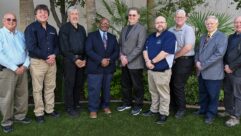FCC staff working on spectrum policy reform for the past year has made key discoveries in the past year: some bands of spectrum are heavily used while others are not and more spectrum could be shared. Task force members echoed what Chairman Michael Powell said at the University of Colorado last week: spectrum isn’t necessarily scarce, it’s just used and allocated inefficiently.
“If we’re ever going to solve this spectrum problem we need to learn how to get to those vacancies,” FCC Chairman Michael Powell told reporters after the commission accepted the task force report. He repeated his often-quoted adage: “There’s not a lot of spectrum left in the FCC closet.”
Interference-protection efforts suggested by the task force include moving away from focusing on transmitters and towards building receivers that better resist interference and at the same time, establish receiver standards.
An FCC staffer told RW privately the spectrum-sharing idea would not likely be practical for radio nor TV, as stations use their spectrum all the time, but the idea may work for other spectrum users.
When pressed for details about receiver standards, task force chairman Paul Kolodzy none exist now, and possibilities include mandated standards to voluntary standards. Again, the task force isn’t singling out radios, but rather broadly looking at all receive devices.
Staffers hopes to get the report out next week. Commissioners see the document as a way to spark discussion among industry about spectrum efficiency.
FCC Spectrum Task Force Shares Recommendations
FCC Spectrum Task Force Shares Recommendations










